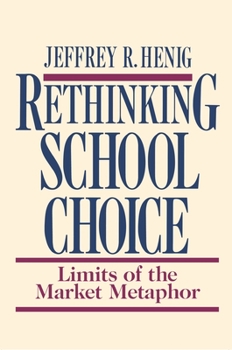Rethinking School Choice: Limits of the Market Metaphor
Select Format
Select Condition 
Book Overview
Advocates of school vouchers and other choice proposals couch their arguments in the fashionable language of economic theory. Choice initiatives at all levels of government have succeeded, it is claimed, because they shift responsibility for education reform from government to market forces. This timely book disputes the appropriateness of the market metaphor as a guide to education policy.
Format:Hardcover
Language:English
ISBN:0691033471
ISBN13:9780691033471
Release Date:February 1994
Publisher:Princeton University Press
Length:312 Pages
Weight:1.40 lbs.
Dimensions:1.1" x 7.8" x 10.0"
Customer Reviews
1 rating
Thoughtful analysis
Published by Thriftbooks.com User , 19 years ago
This book is a dispassionate and thoughtful analysis of school choice, particularly as related to the market metaphor, the notion that schools can improve if their is market competition for education. In large measure the book succeeds as an antidote to probably too hasty claims regarding choice as a panacea. Among other things, it uses data to answer unfounded assertions that American schools have been in a period of pronounced decline. Also, in drawing on principles of democracy (with schools as institutions that reflect shared civic values) the work also envisions the role of school boards as potentially salient or necesary as a way of giving civic voice to the shared societal purposes of schooling. Henig embraces the idea that some forms of school choice can generate useful innovations. Still, this work draws one to the precept that public policy claims should have grounds that are less ideological as has at times been the case. Assessements of school choice should be rooted in a narrow multidisciplinary orientation, not based on a given narrow metaphor.






